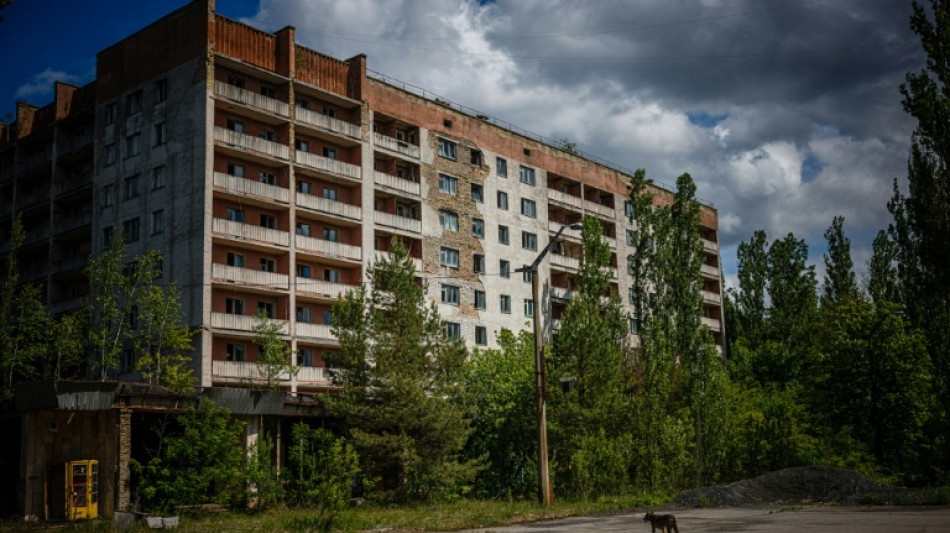
-
 Bangladesh begins three days of mass political rallies
Bangladesh begins three days of mass political rallies
-
Children learn emergency drills as Kashmir tensions rise
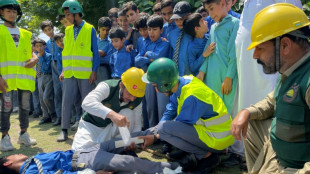
-
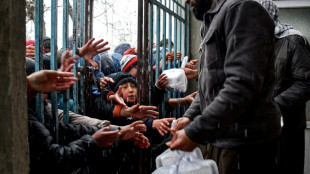 Millions of children to suffer from Trump aid cuts
Millions of children to suffer from Trump aid cuts
-
Veteran Wallaby Beale set for long-awaited injury return

-
 Syria's Druze take up arms to defend their town against Islamists
Syria's Druze take up arms to defend their town against Islamists
-
Tesla sales plunge further in France, down 59% in April

-
 US calls on India and Pakistan to 'de-escalate'
US calls on India and Pakistan to 'de-escalate'
-
Israel reopens key roads as firefighters battle blaze

-
 Europe far-right surge masks divisions
Europe far-right surge masks divisions
-
James will mull NBA future after Lakers playoff exit

-
 Ukraine's chief rabbi sings plea to Trump to side with Kyiv
Ukraine's chief rabbi sings plea to Trump to side with Kyiv
-
Australian mushroom meal victim 'hunched' in pain, court hears

-
 Lakers dumped out of playoffs by Wolves, Rockets rout Warriors
Lakers dumped out of playoffs by Wolves, Rockets rout Warriors
-
Booming tourism and climate change threaten Albania's coast

-
 US reaching out to China for tariff talks: Beijing state media
US reaching out to China for tariff talks: Beijing state media
-
Tariffs prompt Bank of Japan to lower growth forecasts

-
 Kiss faces little time to set Wallabies on path to home World Cup glory
Kiss faces little time to set Wallabies on path to home World Cup glory
-
Serbian students, unions join forces for anti-corruption protest

-
 Slow and easily beaten -- Messi's Miami project risks global embarrassment
Slow and easily beaten -- Messi's Miami project risks global embarrassment
-
Fan in hospital after falling to field at Pirates game

-
 Nuclear power sparks Australian election battle
Nuclear power sparks Australian election battle
-
Tokyo stocks rise as BoJ holds rates steady

-
 Bank of Japan holds rates, lowers growth forecasts
Bank of Japan holds rates, lowers growth forecasts
-
'Sleeping giants' Bordeaux-Begles awaken before Champions Cup semis

-
 Napoli eye Scudetto as Inter hope for post-Barca bounce-back
Napoli eye Scudetto as Inter hope for post-Barca bounce-back
-
Germany's 'absolutely insane' second tier rivalling Europe's best

-
 PSG minds on Arsenal return as French clubs scrap for Champions League places
PSG minds on Arsenal return as French clubs scrap for Champions League places
-
UK WWII veteran remembers joy of war's end, 80 years on

-
 Myanmar junta lets post-quake truce expire
Myanmar junta lets post-quake truce expire
-
Rockets romp past Warriors to extend NBA playoff series

-
 Messi, Inter Miami CONCACAF Cup dream over as Vancouver advance
Messi, Inter Miami CONCACAF Cup dream over as Vancouver advance
-
UN body warns over Trump's deep-sea mining order

-
 UK local elections test big two parties
UK local elections test big two parties
-
US judge says Apple defied order in App Store case

-
 Seventeen years later, Brood XIV cicadas emerge in US
Seventeen years later, Brood XIV cicadas emerge in US
-
Scorching 1,500m return for Olympic great Ledecky in Florida

-
 Israel's Netanyahu warns wildfires could reach Jerusalem
Israel's Netanyahu warns wildfires could reach Jerusalem
-
Istanbul lockdown aims to prevent May Day marches

-
 Formation Metals Announces Appointment of Adrian Smith to Advisory Committee
Formation Metals Announces Appointment of Adrian Smith to Advisory Committee
-
Cerrado Gold Announces Q4 And Annual 2024 Financial Results

-
 Australian guard Daniels of Hawks named NBA's most improved
Australian guard Daniels of Hawks named NBA's most improved
-
Mexico City to host F1 races until 2028

-
 Morales vows no surrender in bid to reclaim Bolivian presidency
Morales vows no surrender in bid to reclaim Bolivian presidency
-
Ukraine, US sign minerals deal, tying Trump to Kyiv
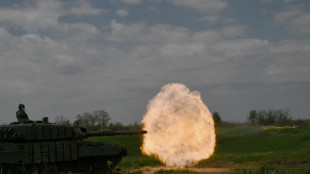
-
 Phenomenons like Yamal born every 50 years: Inter's Inzaghi
Phenomenons like Yamal born every 50 years: Inter's Inzaghi
-
Ukraine, US say minerals deal ready as Kyiv hails sharing
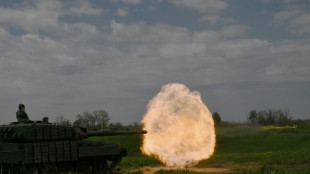
-
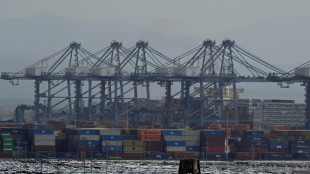 Global stocks mostly rise following mixed economic data
Global stocks mostly rise following mixed economic data
-
O'Sullivan says he must play better to win eighth snooker world title after seeing off Si Jiahui

-
 Sabalenka eases past Kostyuk into Madrid Open semis
Sabalenka eases past Kostyuk into Madrid Open semis
-
Netflix's 'The Eternaut' echoes fight against tyranny: actor Ricardo Darin


'No way out': Life under the Russians at Chernobyl
It began as a normal shift at Chernobyl for Oleksiy Shelestiy but as night turned to day on February 24, distant artillery fire and the arrival of Russian troops changed everything.
More than 100 employees, who had arrived at the defunct nuclear plant for their night shift just hours earlier, were now trapped as Russian forces crossed into Ukraine and seized swathes of land on their way towards Kyiv.
The capture of Chernobyl by Russian forces kicked off a weeks-long ordeal that saw power briefly cut at the facility and employees carefully monitored by the invaders.
"We were not mentally prepared for this," Shelestiy told AFP. "But we had no way out."
As a night shift supervisor, Shelestiy oversaw a team of nearly a dozen people charged with monitoring electricity supplies at Chernobyl, where a massive sarcophagus covers the remains of a destroyed nuclear reactor to prevent radioactive contamination.
The plant was the site in 1986 of the world's worst nuclear accident. Since then, it has been maintained by thousands of Ukrainian workers and closely monitored by international experts to contain its radioactive waste.
For years, a carefully executed shift schedule and monitoring network kept a close eye on radiation levels at the facility. Then Russian forces poured across the border from Belarus and seized Chernobyl, holding its workers captive and cutting it off from the world.
"I understood that an accident was possible," Shelestiy recalled.
"Emotional and psychological pressure did not allow me to focus on this. We just tried to do our job and tried to control all the parameters so that nothing could happen."
- Power struggle -
The most harrowing period of the occupation began on March 9, when power was cut to the plant due to nearby fighting, Shelestiy said.
Experts acknowledged there would be no repeat of the 1986 meltdown in the absence of a working reactor on the grounds. But electricity is nonetheless vital to power the security infrastructure, including the cooling systems for the spent nuclear fuel storage facility.
For days, the workers relied first on their diesel supplies and later fuel provided by the Russians until they were able to re-route power through the Belarus grid.
All the while, the Ukrainians trapped at the plant were only able to catch snippets of what was happening outside Chernobyl by listening to radio broadcasts and through occasional calls back home on one of the plant's landlines.
The staff were not able to return home and became increasingly drained. That risked compromising their ability to fulfil their safety and security duties.
"It was mentally and emotionally difficult," Shelestiy explained.
Employees were also closely watched and forced to navigate a dizzying network of checkpoints set up by the Russians on the plant's grounds -- hindering basic movements and maintenance at the facility.
Ukrainian authorities have since accused the Russians of showing wanton disregard for basic safety during their occupation of Chernobyl, saying its soldiers dug trenches and set up camps in contaminated areas of the facility that had received heavy doses of radiation.
"They dug bare soil contaminated with radiation, collected radioactive sand in bags for fortification, breathed this dust," said Energy Minister German Galushchenko in April, claiming the Russian forces had been exposed to a "shocking" amount of radiation.
"Every Russian soldier will bring a piece of Chernobyl home. Dead or alive," the minister added.
The head of the International Atomic Energy Agency, Rafael Grossi, later said "an increase in the levels" of radiation had been recorded at Chernobyl but insisted the matter was under control.
"The situation is not one that could be judged as posing a great danger to the environment and to people at the moment we were taking these measures," he added.
Shelestiy was unable to confirm details about alleged Russian misconduct at Chernobyl, where he was mostly forced to remain at his workstation and had little interaction with their troops.
- 'Worried, nervous' -
Amid the uncertainty, Shelestiy said he tried to console his team, whose families in the nearby town of Slavutych had been largely surrounded by Russian forces.
Back in Slavutych, mayor Yuriy Fomichev walked a fine line, managing relations with Russian forces, helping smuggle supplies into the besieged community and comforting the families of the captive workers.
"I had to calm them down and explain that it was necessary to be patient," said Fomichev.
Built in the aftermath of the Chernobyl accident as a settlement for evacuated families who had been living near the plant in 1986, Slavutych was one of the last purpose-made towns constructed from scratch during the final days of the Soviet Union.
For many of its residents, seeing chaos engulf Chernobyl again was an unwelcome case of deja-vu.
"We were worried, nervous," said Tamara Shyrobokova, 75, a former Chernobyl employee who was resettled in Slavutych following the meltdown.
"I was literally shocked by the fact that Russia attacked Ukraine. No-one could ever imagine this," she added.
The whole episode also perplexes Shelestiy. He was released following a round of negotiations days before the Russians retreated, after their troops were routed in the battle for Kyiv.
"They said they were trying to free me from something but I don't understand from what," said Shelestiy. "I can't understand it."
Y.Nakamura--AMWN